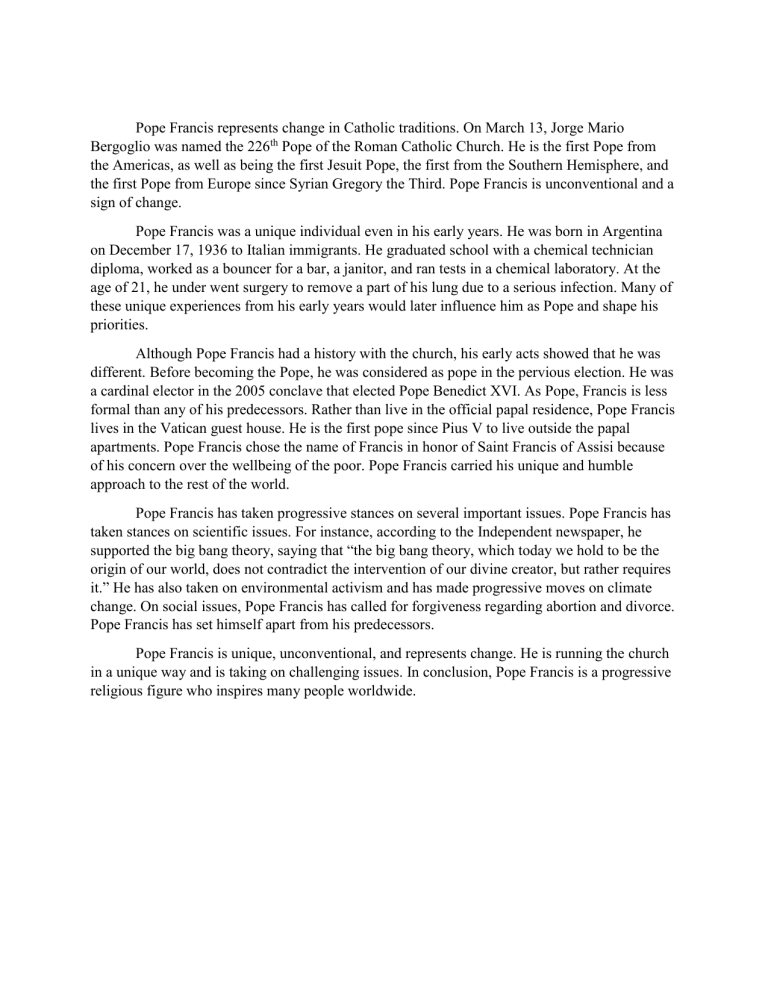Pope Francis, a name synonymous with humility and reform, has captured the hearts of millions across the globe. As the first pope from the Americas and the first Jesuit to lead the Catholic Church, his journey is nothing short of inspiring. His dedication to addressing global issues such as poverty, climate change, and social justice resonates deeply with people of all faiths.
Delving into the life and legacy of Pope Francis offers a wealth of insights that go beyond his public persona. From his early days in Argentina to his pivotal role as the leader of the Catholic Church, this beloved figure continues to inspire through his actions and words. This article aims to explore lesser-known stories and facts about Pope Francis, shedding light on what makes him an extraordinary spiritual leader.
Journey to the Papacy: A Humble Beginning
Born Jorge Mario Bergoglio, Pope Francis made history in 2013 when he became the first pontiff from the Americas. His election marked a significant shift in the Catholic Church's leadership, bringing a fresh perspective to its governance. Prior to becoming pope, Bergoglio served as the Archbishop of Buenos Aires, where he was known for his simple lifestyle and commitment to serving the marginalized.
In March 2013, Cardinal Bergoglio was elected the 266th pope, choosing the name Francis in honor of St. Francis of Assisi. This choice reflected his desire to emphasize humility, simplicity, and care for the environment—themes that have characterized his papacy. His decision to live in a modest Vatican guesthouse rather than the grand Apostolic Palace further underscored his commitment to these values.
The selection of a pope from Latin America also highlighted the growing influence of the region within the Catholic Church. Pope Francis' background as a Jesuit priest brought a unique theological perspective, focusing on evangelization and social justice. His approach has been both admired and criticized, yet it undeniably reshaped the Church's direction.
Education and Early Life: Shaping a Future Leader
Pope Francis' early life in Buenos Aires played a crucial role in shaping his worldview. Born into a middle-class family, he pursued chemical engineering before discerning a call to priesthood. In his youth, he faced health challenges, including the removal of part of his lung, which later became a little-known fact among admirers.
His education included studies in philosophy and theology, eventually leading to his ordination as a priest in 1969. Throughout his career, Pope Francis emphasized the importance of education, advocating for accessible learning opportunities for all. His experiences in academia and pastoral work equipped him with the skills necessary to address complex global issues.
As a young man, Bergoglio displayed a keen interest in helping those less fortunate, often volunteering in impoverished neighborhoods. These formative years instilled in him a deep compassion for the poor and vulnerable, principles that continue to guide his leadership today. His ability to connect with diverse communities stems from these early interactions and experiences.
Reforms and Legacy: Transforming the Church
Under Pope Francis' leadership, the Catholic Church embarked on a series of reforms aimed at modernizing its operations and addressing long-standing issues. One notable initiative involved restructuring the Vatican's financial systems to enhance transparency and accountability. Such efforts demonstrated his determination to tackle corruption and inefficiency within the institution.
Another significant aspect of his papacy was the promotion of interfaith dialogue and collaboration. Pope Francis frequently engaged with leaders from other religions, fostering mutual respect and understanding. His open-minded approach helped bridge divides and fostered greater unity among different faith communities worldwide.
Despite facing opposition from conservative factions within the Church, Pope Francis remained steadfast in his mission to make the Catholic Church more inclusive and relevant in today's world. By prioritizing issues like environmental stewardship, economic inequality, and human rights, he ensured that the Church remained actively engaged in addressing pressing global concerns. Through his compassionate leadership style and unwavering commitment to justice, Pope Francis leaves behind a lasting legacy that will undoubtedly shape the future of the Catholic Church.

